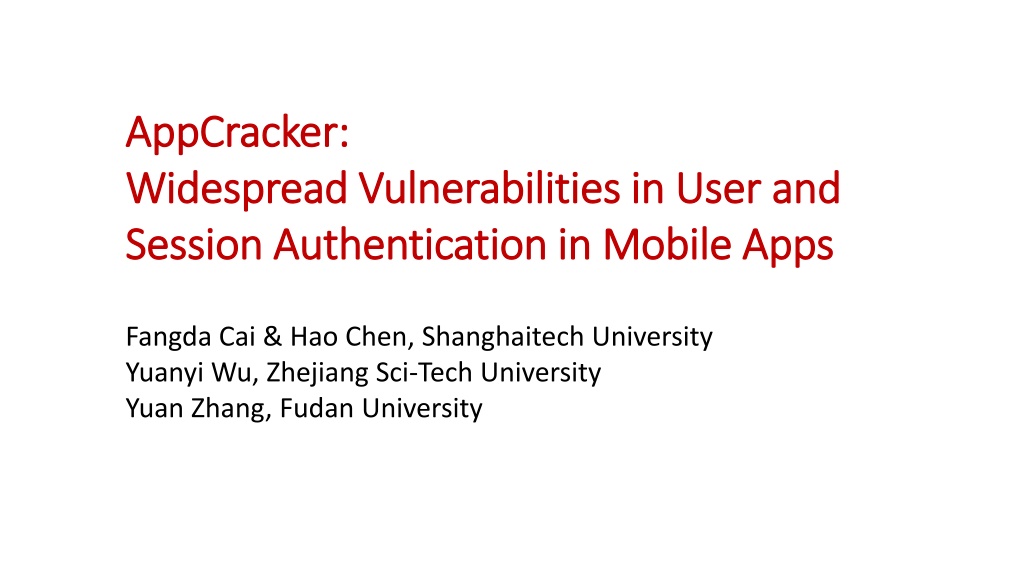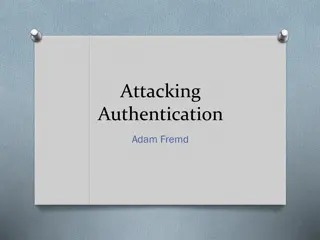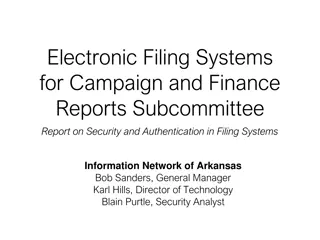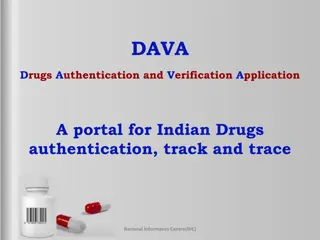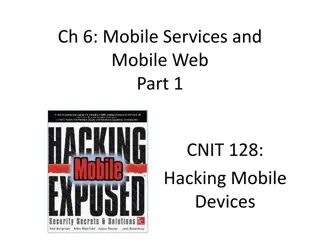Mobile App Security: Vulnerabilities in User and Session Authentication
Mobile apps face widespread vulnerabilities in user and session authentication, posing threats like eavesdropping and man-in-the-middle attacks. End-to-end security is crucial to protect apps from untrusted networks. App developers must prioritize security measures to prevent unauthorized access to user data.
- Mobile App Security
- Authentication Vulnerabilities
- End-to-End Security
- Threat Modeling
- Chinese Android Market
Download Presentation

Please find below an Image/Link to download the presentation.
The content on the website is provided AS IS for your information and personal use only. It may not be sold, licensed, or shared on other websites without obtaining consent from the author. Download presentation by click this link. If you encounter any issues during the download, it is possible that the publisher has removed the file from their server.
E N D
Presentation Transcript
AppCracker AppCracker: : Widespread Vulnerabilities in User and Widespread Vulnerabilities in User and Session Authentication in Mobile Apps Session Authentication in Mobile Apps Fangda Cai & Hao Chen, Shanghaitech University Yuanyi Wu, Zhejiang Sci-Tech University Yuan Zhang, Fudan University
Threat Model Apps are benign, but potentially vulnerable Users are benign, and may connect to untrusted/unencrypted WiFi networks Adversaries can only capture/modify traffic
Focus on apps in Chinese Android Market as the first step Large Android user population Users mainly download apps from Chinese App Market
Criteria of app selection Baidu App Market Top apps by number of downloads in each of the major categories Apps from companies with huge market capitalization 76554MM$ 231400MM$ 277336MM$ 249192MM$ 40438MM$ ( Data are gathered from NYSE, NASDAQ, HKEx in September of 2014 )
Focus on vulnerabilities in user and session authentication User authentication: capture the victim user s login credentials Session authentication: hijack the victim s session
Methodology Find vulnerabilities: combine code analysis and app traffic analysis Validate vulnerabilities: AppCracker Describe vulnerabilities by mini-language designed in YAML format Run in two modes: Passive mode, Active mode App Server App Web Server AppCracker WiFiAccess Point
Diverse vulnerabilities Passive Attacks Plaintext or Encoded Data Encryption Sessions Message Integrity Active Attacks Forged Certificate Public key substitution
Passive Attack - Plaintext / Encoded Data POST http://180.153.132.65/ajax/json/account/loginapp Host: m.dianping.com ... username: shhtech@sina.com password: shanghai ... DianPing review businesses, purchase discount gift certificates POST http://119.254.112.81/user/login Host: android-api.vancl.com ... username: c2hodGVjaEBzaW5hLmNvbQ== (base64 of shhtech@sina.com) ... password: c2hhbmdoYWk= (base64 of shanghai) Vancl online retailer
Passive Attack - Symmetric Key Encryption Insecure key selection Insecure key distribution Insecure modes of operation
Passive Attack - Symmetric Key Encryption Iqiyi Video video service Insecure key distribution org.qiyi.android.corejar.k.a.at Iqiyi123)(*\x00\x00\x00\x00\x00 Insecure key selection private static byte[] a = { 105, 113, 105, 121, 105, 49, 50, 51, 41, 40, 42, 0, 0, 0, 0, 0 }; paramString = paramString.getBytes(); SecretKeySpec localSecretKeySpec = new SecretKeySpec(a, "AES"); Cipher localCipher = Cipher.getInstance("AES/ECB/PKCS7Padding", "BC"); localCipher.init(1, localSecretKeySpec); paramString = new String(org.qiyi.android.corejar.l.com1.b(localCipher.doFinal(paramString), 0), "utf-8"); Insecure modes of operation
Passive Attack - Public Key Encryption Home-grown login mechanisms of apps from Alibaba login process App App Server Request a Public Key Taobao, online retail platform Public Key Tmall, online retailer JuHuaSuan, group buying Username Password RSA encrypted 1688, wholesale/procurement
Passive Attack - Public Key Encryption Insecure key selection POST http://140.205.160.4/gw/com.taobao.client.sys.getapptoken/*/ pubKey: 98266 762829\n3, Modulus TMall GET http://140.205.160.4/gw/com.taobao.client.sys.getapptoken/*/?... pubKey: 112888 883973\n3, JuHuaSuan GET http://140.205.160.4/rest/api3.do?... pubKey: 984813 981523\n3, 1688
Passive Attack - Sessions Session ID in request body userToken: 9c68bf54-4ee3-46a3-8d3fa2f85e8a0372 Content-Length: 622 Host: interface.m.yhd.com YiHaoDian online retailer
Passive Attack - Sessions Session ID in cookie Cookie: JSESSIONID=06F1JC 22YgYR!1329849507 HZ Bank Cookie: BANKIDP=PAICPORTAL; responseDataType=JSON; JSESSIONID=J0jBKj 59GQDjT!-391559857; BIGipServerIBANKIBP_little_core_test_Pool=491003052.32886.0000 PingAn Bank
Passive Attack Message Integrity Message authentication code App App Server login process sign : fed1e14f08db04c3c2dacb767364fa27 v, t, imei, data, api, imsi, appkey android.taobao.tutil.TaoApiSign.java md5('&'.join( appSecret, md5(appKey), api, v, imei, imsi, md5(data), t )) Public Key sign : 39f1feee53509ba42ac88e3c42989488 Username Password Secret key, isn t in the payload
Passive Attack Message Integrity Message authentication code com.taobao.tao.util.Constants.java . . . appSecret ... public static String getAppsecret() { if (Constants.appsecret == null || "".equals(Constants.appsecret)) { String string = new String(); for (int i = 0; i < Constants.appsecretSigned.length(); ++i) { string += (char)(Constants.appsecretSigned.charAt(i) - i % 5); } Constants.appsecret = string; } TaoLog.Logd("appkey", Constants.appsecret); return Constants.appsecret; } res/values/strings.xml <stringname="appsecret"> 756h;d8g:429d;57cf<j8g5f :f3:d<d4 </string>
Passive Attack Message Integrity Attackers can compute correct MAC App App Server login process sign : fed1e14f08db04c3c2dacb767364fa27 v, t, imei, data, api, imsi, appkey android.taobao.tutil.TaoApiSign.java md5('&'.join( appSecret, md5(appKey), api, v, imei, imsi, md5(data), t )) Public Key sign : 39f1feee53509ba42ac88e3c42989488 Username Password
Passive Attack Message Integrity Obfuscated message authentication code App App Server login process JingDong Online retailer Body: username, md5(password) URL Parameter: sign, sv, st, functionId, uuid, username md5(password) functionId uuid sign sv st com.jingdong.app.Sign public static native Map getSignMap( Map paramMap, List, paramList); libjdmobilesecurity.so
Passive Attack Message Integrity Replay attack Use the native method as an oracle Victim s Attacker s username md5(password) sign username md5(password) sign (valid) AppCracker App App Server DB of victims login credentials Emulator sign, sv, st functionId, body, uuid jdtricker libjdmobilesecurity.so
Active Attack - Forged Certificate Most apps we examined using SSL accept self-signed certificate This indicates they failed to verify certificate authority is trusted common name in certificate matches expected domain name
Active Attack - Public key substitution Taobao App App Server login process sign : fed1e14f08db04c3c2dacb767364fa27 v, t, imei, data, api, imsi, appkey Public Key e.g. 95012 82397\n65537 sign : 39f1feee53509ba42ac88e3c42989488 Username Password
Active Attack - Public key substitution Taobao App AppCracker App Server request a public key forward the request real-public-key forged-public-key Taobao encrypt password with forged public key AppCracker decrypt {????????}?????? ?????? re-encrypt it with real public key store real public key to database provide a forged one to Taobao {password}forged pubkey {password}real pubkey
AppCracker has confirmed 100 top apps are vulnerable Top apps from all categories 44 of them are from companies whose market capitalization is over 1 billion US dollars Login credentials can be stolen, sessions can be hijacked Vulnerabilities are diverse
Lessons learned End-to-end security matters Use standard cryptographic protocols No place to hide in the app Security through obscurity doesn t work Build security into apps from the beginning
Limitations and Future work Consider an app vulnerable only after successfully attacked it Rely on manual analysis to discover vulnerabilities of apps Automation
